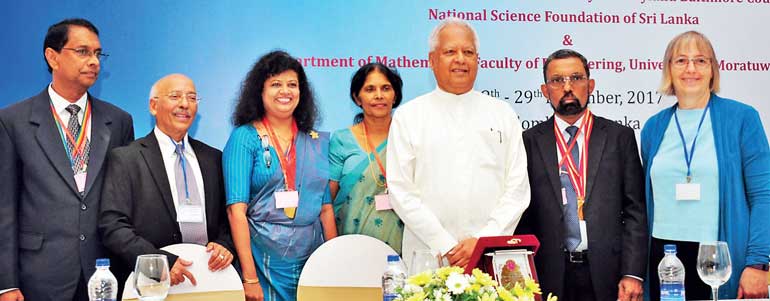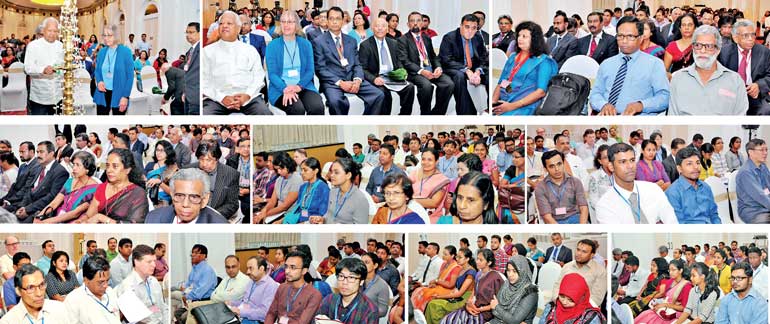Tuesday Feb 24, 2026
Tuesday Feb 24, 2026
Friday, 29 December 2017 00:00 - - {{hitsCtrl.values.hits}}



By Shannon Jayawardena
Minister of Special Assignments Sarath Amunugama, while speaking at the International Statistics Conference 2017 which is being held from 28-29 December, stated the country needed the service of good statistics and statisticians.
The conference, themed ‘Statistics for Good Governance’, was organised by the Institute of Applied Statistics Sri Lanka (IASSL) in collaboration with the Department of Mathematics and Statistics, University of Maryland Baltimore County (UMBC) USA, the National Science Foundation of Sri Lanka and the Department of Mathematics, Faculty of Engineering of the University of Moratuwa, Sri Lanka.
Chief Guest Minister of Special Assignments Sarath Amunugama said: “I myself have great admiration for statistics and statisticians because many years ago I studied the subject as part of my degree in sociology at the University of Peradeniya. Statistics have been defined as the use of mathematical principles of the collection and analysis of data. In my opinion you can classify countries in the world as developing and developed countries whereby the difference is that developing countries do not adequately make use of statistical information.”
“Without that basic commitment it is very difficult to think of developing the country or comparing the type of development we have with the efforts of others. So I would say that one of the characteristics of the lack of development in a country is the inability to foster and use statistics in an effective manner. This country very much needs the service of good statistics and statisticians,” he added.
IASSL is a non-profit organisation with a mandate to support the professional development of statisticians and statistical education in Sri Lanka. Its service is towards those interested in the application of statistics, be it in their day-to-day work or daily routine and provides them with training, research, publication and professional communication opportunities.
The International Statistics Conference is one the largest events organised by IASSL and is held every three years. This year the event invited over 180 participants from several countries to share their knowledge in order to further build up statisticians’ capabilities.
Alongside the conference, five parallel sessions were held to initiate discussion and collaboration between professionals and students.
At present the entire world is committed towards the success of the Sustainable Development Goals hence statistics play a vital role when it comes to analytical information. It provides updated data and analytical support to the planning, monitoring and evaluation process.
University of California Department of Statistics and American Statistical Association former President Jessica Utts in her keynote speech stated: “Whether one is governing a nation, a large organisation, a local area or a small club, good governance means making decisions that benefit the constituents in an efficient and effective way. No matter what size or structure an organisation has, data and statistical knowledge should play a major role in the process of making decisions and setting policy.”
Speaking on the role of a statistician, she said: “There are at least three ways that statistics and statisticians can play a role in effective governance. First, there is the necessity for good data. Collecting massive amounts of data has become easy. Collecting good data remains difficult. Knowing the difference is crucial for good governance and is something statisticians are equipped to help evaluate. Secondly, they should help educate people, ranging from politicians and policymakers to the general public on the appropriate use and interpretation of data and finally statisticians play a major role in improving statistical methods for more efficient and accurate data collection and analysis.”
The sessions highlighted topics such as the statistical modeling of self-reported and proxy observations in longitudinal studies, recent developments of multivariate time series analysis and application, statistical analysis in high level computer vision and generalised inference with application to business analytics.
Touching upon the aspects of data perturbation, synthetic data and elaborating on how to create and sensibly analise such data, University of Maryland Baltimore County, Department of Mathematics and Statistics Professor Bimal Sinha in his keynote said: “A main focus of recent research in any government agency is the novel creation and valid analysis of perturbed data which are either magnitude or categorical in nature. Often some form of perturbation of original data is used through differential privacy approaches and so research is needed to provide valid statistical analysis of the released data and evaluate the level of confidentiality protection supplied by the underlying new data generation methods.”
Pix by Lasantha Kumara